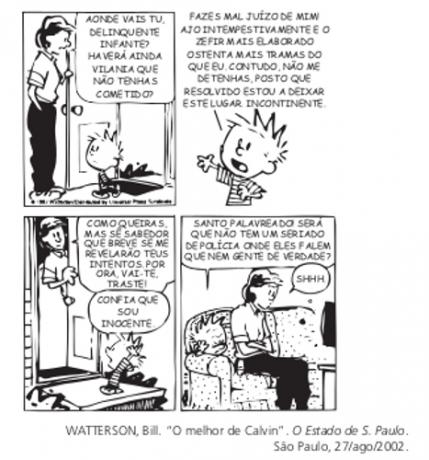The human being loves to talk! We are all the time talking to someone in the most diverse communication situations. When we use the code, which is the Portuguese language, we involve numerous mental operations that lead us to choose the vocabulary and even a more appropriate way of speaking, and this way can vary according to the situation in which we are involved.
We are multilingual, even when we master a single language. This happens because speakers have a great capacity to adapt to different contexts, making different uses of the same language. At school, talking to friends, we use a certain language; when we talk to the teacher or the teacher, the language undergoes some changes, becoming more formal and even more respectful. This ability to “speak differently” is called linguistic adequacy. But do you know what linguistic adequacy is?

Our speech behaves in different ways: with our friends, we use colloquial language. In formal situations, we prefer the standard language
Linguistic adequacy is the ability of speakers to adapt language according to the need of the moment. We can choose two different Portuguese language records: a standard variety or popular variety, also known as colloquial language. Each of these varieties must be employed in specific situations, and both, without distinction, work well, fulfilling specific roles in communication. Note an example of linguistic adequacy that was part of the National High School Exam test in 2009:
Manager: — Good afternoon. How can I help you?
Customer: — I am interested in financing for vehicle purchase.
Manager: — We have several types of credit. Are you our customer?
Client: — I'm Júlio César Fontoura, I'm also a bank employee.
Manager: — Julinho, is that you, man? This is Helena! Are you in Brasilia? I thought you still had it at the Uberlândia agency! Drop by for us to talk calmly.
BORTONI-RICARDO, S. M. Mother tongue education.
São Paulo: Parabola, 2004 (adapted).
Did you notice that the manager's way of speaking underwent a major change when she recognized a friend in the customer? Before knowing that she was talking to her colleague, she adopted the standard variety, a record that features a speech more formal, typical of professional relationships and times when we don't know well our interlocutor. However, after the friend identified herself, she changed the register, preferring the colloquial language, whose main characteristic is the casualness and informality. Now, notice what can happen when we don't adapt the language to the communication situation:

To be multilingual in our own language, it is necessary to pay attention to the linguistic adequacy
Looking at the dialogue between Calvin and his mother, can we say that he made use of linguistic adequacy? Certainly not! The use of formal language and full of “difficult” words contributed to the comic strip's humor effect, well exemplifying that for each moment there is a more adequate way of speaking. In our home, with our family, or at school, with our friends, it is normal for colloquiality to be adopted in the speech. However, in situations that require a more formal speech, we must give up slang and other expressions typical of colloquiality, preferring to standard variety. So stay tuned, communicate efficiently and appropriately!
By Luana Castro
Graduated in Letters

